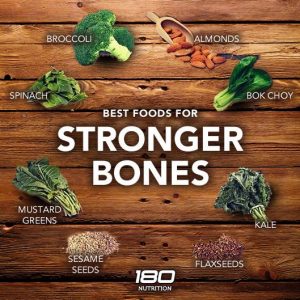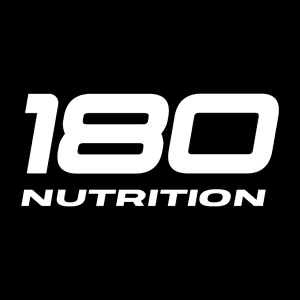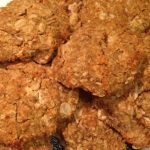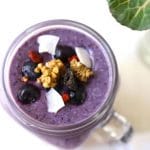By Angela Greely
Guy: This is a fantastic post by nutritionist Angela Greely. If you avoid dairy and milk, this will help you with some of the confusion when buying your next milk alternative.
Personally (in case you are wondering) I only drink coconut milk and coconut cream. I have a splash in my long black (yes, it tastes pretty good!), I religiously put a 100ml in my breakfast smoothies and also treat myself to a coconut milk 180 dessert mousse once in a while. Anyway, enough of my ramblings, over to Angela…
Dairy Free Milk Alternatives
Angela: Many people choose to have milk alternatives for lots of different reasons. They may be lactose intolerant, follow a vegan or paleo diet, don’t like the taste or have a cow’s milk allergy. Whatever the reason let’s discuss the things that you need to think about when choosing an alternative.
We’ve chosen some of the main alternatives; coconut, almond, rice, oat and soy. All lactose free, all low in fat and cholesterol apart from coconut milk. The thing to remember is not all fats are the same! We are fans of natural saturated fats and you should be too.
1. Coconut Milk & Cream

- Rich in medium chain fatty acids (MCFAs), which is a type of saturated fat that the body processes differently than other saturated fats. They permeate cell membranes easier. Some studies have shown that they may promote weight loss as the MCFAs stimulate your metabolism and rapidly metabolise into energy in the liver and are less likely to be stored as fat
- Lauric acid (MCFA), which makes up 50% of the fat profile in coconut milk converts in the body to monolaurin, which has anti-viral, anti-bacterial and anti-protozoa properties
- Rich source of iron and potassium
The bad…
- BPA lining of certain canned products
- Guar gum, which is used as a thickening agent, might be difficult for some people to digest.
At the supermarket
We recommend the brand Ayam. No added preservatives with simple ingredients of coconut kernel extract and water. They are also BPA friendly cans.
Per 100ml Ayam coconut milk:
- Protein: 2.6g
- Carbs: 3.9g
- Sugar: 1.6g
- Calcium: Not specified
2. Almond Milk

- Almonds contain nutrients such as protein, fibre, calcium, vitamin E, magnesium, selenium, manganese, zinc, potassium, iron, phosphorus and trytophan
- Recommended to lower blood-sugar levels and to treat constipation
- Contains flavonoids, which help to lower levels of “bad” cholesterol and protect the heart
- Powerful antioxidants in almonds help inhibit the growth of free radicals and support a strong immune system
- Finely ground almonds contain potential prebiotic properties that could help boost digestive health by increasing the levels of certain beneficial bacteria in the stomach.
The bad…
- May be sweetened with sugar or artificial sweeteners and additives
- Carrageenan a common stabiliser and thickening agent in almond milk may be harmful to humans.
At the supermarket
I looked at two brands of almond milk: Australian’s Own Organic Almond Milk and Macro Organic Almond Milk.
Both organic, great! Macro has more calcium but Australian’s Own has less sugar as they only add agave as a sweetener whereas Macro add rice syrup and sugar. Agave as a sweetener doesn’t sit well with me (here’s why). I would choose Macro with the added calcium but don’t over do it. Good to know a large handful of almonds contains 120mg of calcium with no added sweeteners.
The best alternative is make your own Almond milk if you have the time, as then you know exactly what’s going in there.
Per 100ml Australian’s Own & Macro:
- Protein: 0.6g, 0.4g
- Carbs: 2.4g, 7.5g
- Sugar: 1.9g, 3.6g
- Calcium: Not specified, 33mg
3. Rice Milk

- High in antioxidants and B Vitamins
- Is the most hypoallergenic of all the milks
The bad…
- High in carbohydrates as rice is high in starch. Not good for diabetics
- Low in protein and calcium (most brands will be fortified with vitamin A, D and calcium)
- Added thickening agents
- May be sweetened with sugar or artificial sweeteners
At the supermarket
It was great to find that I didn’t come across any brands using thickening agents or added sweetening agents but they all had vegetable oil as an ingredient. I avoid vegetable oils at all costs, and that’s another blog all of it’s own. Read Toxic Oil by David Gillespie if you want to learn more.
Pureharvest Rice Milk Organic had the simplest ingredients of filtered water, organic whole brown rice (15%), organic sunflower oil, organic plant calcium and sea salt.
Note: Even though this contains ‘organic sunflower oil’, technically this is still a processed vegetable oil so I would avoid it.
Per 100ml Pureharvest Rice Milk:
- Protein: 0.6g
- Carbs: 10.6g
- Sugar: 2.8g
- Calcium: 110mg
4. Oat Milk

- High in fibre, folic acid, vitamin E
- Phytochemicals which protect against heart disease, strokes and some cancers.
The bad…
- Contains gluten so stay clear if you are avoiding gluten in your diet
- Low in protein and calcium
At the supermarket
I liked Vitasoy Oat milk as the other brands included vegetable oils in their ingredients.
Per 100ml Vitasoy Oat Milk:
- Protein: 1.0g
- Carbs: 11.8g
- Sugar: 1.5g
- Calcium: 120mg
5. Soy Milk
Soy is a no-no for us at 180 Nutrition, and here’s why: Click Here
Conclusion
If excluding dairy from your diet you always need to think of replacing the calcium and protein content that you are losing. Try and have protein the size of your fist at every meal.
Other sources of foods that contain calcium are:
- almonds
- broccoli
- buckwheat
- egg yolk
- figs
- green leafy vegetables
- sardines
- sesame seeds
- turnips
If you decide to make your own milk alternatives at home, just make sure you include lots of calcium foods in your diet and protein with every meal.
Remember, the key is to include a variety of foods rich in calcium in your diet and use the milk alternative that works for you.
Love to hear everyone’s thoughts on what milk works for you… Angela 🙂









5 Replies to “Milk Alternatives: Discover the Good & the Bad”
180 protein powder contains whey…
Whey comes from milk. Unusual that you would promote alternatives to milk yet endorse a product containing higher amounts if casein protein than milk. Casein is the elephant
In the room. Please correct me if I’m wrong.
Thanks Dave, many of our readers drink milk/milk alternatives. Lactose is the main culprit as 75% of the population are intolerant to it. This is why we used a Whey Protein Isolate and also offer a non-dairy version. Cheers – Guy
Is there casein protein in whey? Is it okay to have lactose free greek yogurt?
Yes, there is casein protein in whey… I haven’t come across lactose free greek yogurt, but the first thing I would is check the sugar content per serve. Cheers, Guy
Black swan does a lactose free greek style yogurt. 5.4% sugar per 100 gram. Is that high? it doesnt seem to have any extra sugar. you can get it from woolworths
Comments are closed.